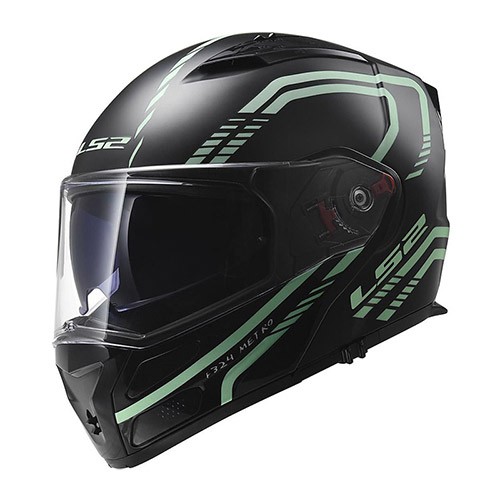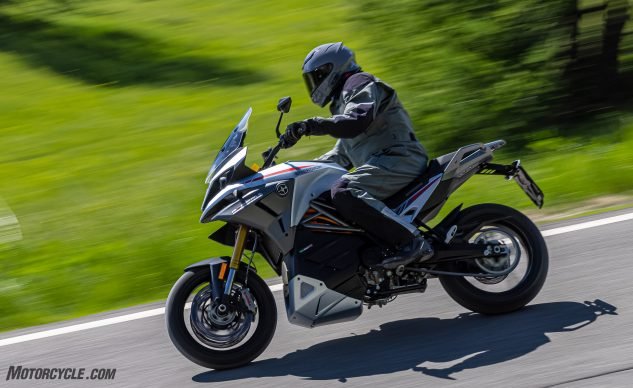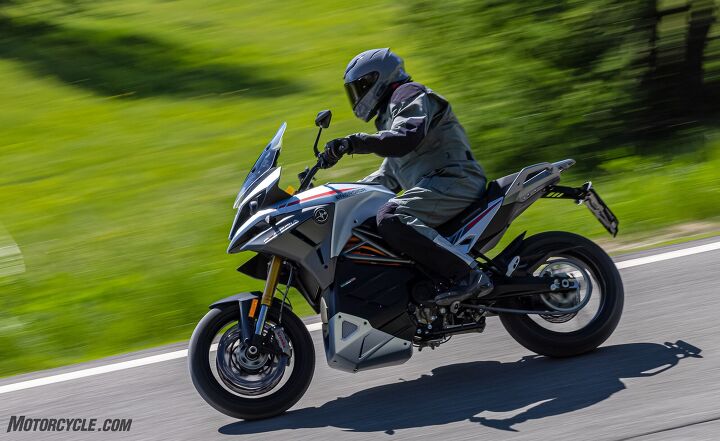
At first blush, creating an electric touring bike appears to be a bold move. And it is. If you were to ask anyone familiar with EV motorcycles what a green tourer would need over other electric models, they would probably list the following: increased range, faster charging capabilities, usable real world power, and no increase in weight while achieving the above goals. As I sit here writing this review with the press kit information in hand, the Energica Experia appears to have developed with those specific goals in mind. Fortunately, I got to have a quick sample of the Experia’s capabilities in the challenging environment of Italy’s Dolomites, a scenic, twisty, and very popular European touring destination.
Redistributed battery weight and increased range, with DC Fast Charging (plus Levels 1 and 2), make for an attractive and nimble EV touring package – as long as you have the charging infrastructure along your planned route.
Editor Score: 91.75%
| Engine | 18/20 | Suspension | 12/15 | Transmission | 10/10 |
| Brakes | 8.5/10 | Instruments | 9/5 | Ergonomics | 9/10 |
| Appearance | 9/10 | Desirability | 8.5/10 | Value | 8/10 |
+ Highs
|
– Sighs
|
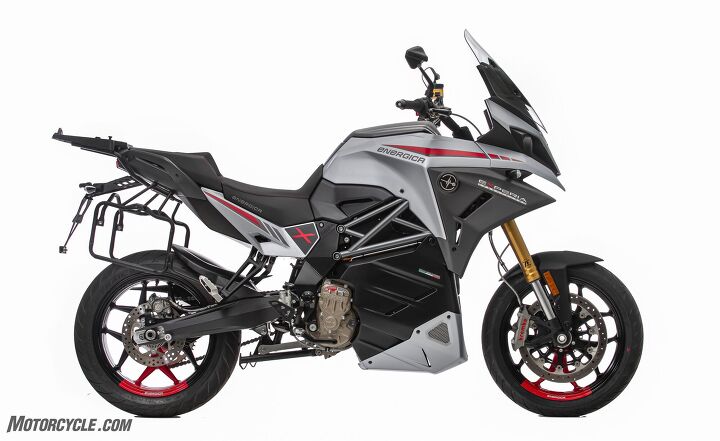
Shown with accessory saddlebag mounts.
More Range, Same Weight
While we are still in the early stages of EV motorcycle development and many people keep wishing for a magic bullet to solve the power, weight, and charge time issues, the reality is that, behind the scenes, battery technology has been improving regularly, with gains of about 10% annually. This leaves EV manufacturers with a choice of what to focus on when developing a new motorcycle: more power, longer range, or less weight. Given the touring goal for the Experia, Energica chose to focus on longer range, creating a 22.5 kWh battery, the largest in a production motorcycle. For comparison, the LiveWire carries 15.4 kWh and the Zero SR/F 14.4 kWh (or maxed out with the optional $2,890 Power Tank to 19.2 kWh). However, there was more to the process than simply cramming more cells into a bigger box.
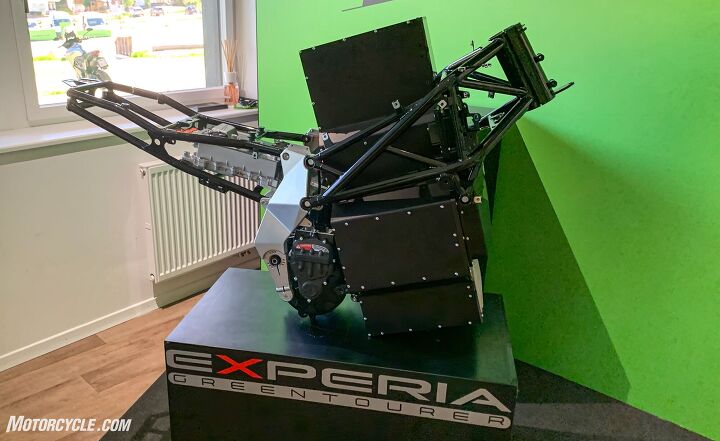
Yes, the RESS takes up most of the space in the frame, but the way it carries its bulk makes for a very different Energica.
Energica’s engineers were creating a new, from-the-ground-up motorcycle and used this opportunity to apply what was learned from both the previous street bikes and the MotoE machines. Rather than placing what is a big rectangular box in the middle of the frame, the Experia’s new Rechargable Energy Storage System (RESS) had its shape massaged to tune the motorcycle’s center of gravity (COG) to improve handling and mask the weight of the RESS. Speaking of weight, despite the increase in capacity, the RESS weighs less than the previous generation.
Other changes within the power plant also helped with the mass centralization. For example, the motor is an entirely new design utilizing centrally-located permanent magnets that weighs a whopping 22 lb. lighter than the previous generation. Although the motor has a greater thermal efficiency, it remains liquid cooled (on the same system as the inverter) and oil lubricated for durability. The lower positioning of the motor in the chassis helps with the lower COG.
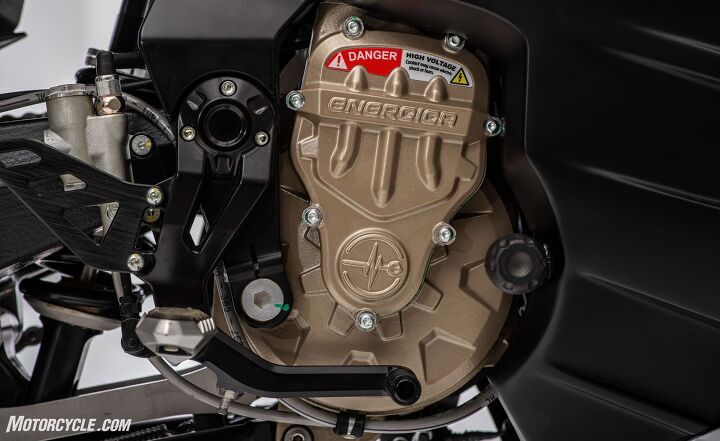
Not only is the new motor 22 lbs. lighter, but also its service intervals have increased to 18,000 miles for oil and 26,000 miles for coolant.
The end result of all these changes is the longest claimed range of any production motorcycle currently available. The claim for city riding is 261 miles, more than enough for a few days of your typical commuter duty. From what I was told by an Energica rep, the highway mileage is 130 miles at a steady 70 mph. While that’s not huge for a touring motorcycle, it’s still a generational improvement.
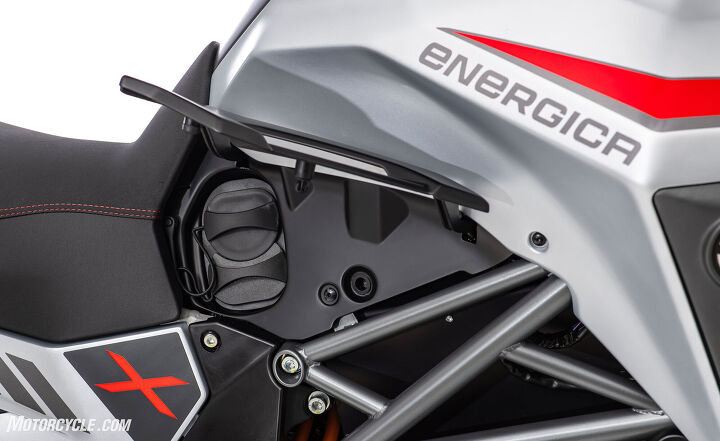
This multi-talented plug allows riders to charge with all three options that are currently available.
Charge It!
Aside from the largest capacity battery and range available in a production motorcycle, the Experia contains another first. It is capable of being charged by Level 1 and 2 plus Level 3, DC Quick Charge systems, making it the first EV bike to offer no-compromises charging. Located just forward of the seat on the right side, hidden under a panel, the charging port is easy to reach and use. One interesting fact about the charging system is that it is also liquid cooled because the components are packed away under the bodywork. Energica claims the DC Quick Charger can reach 80% capacity from a flat battery in just 40 minutes – just enough time to sit and enjoy a coffee break with your passenger.
Chassis Updates
To carry that new battery and accommodate the new motor location, a new chassis was developed. Although it keeps the steel trellis construction of previous Energicas, the trellis mounts to two aluminum side plates to mount the cast aluminum swingarm, and although it looks like it might be, the battery is not a stressed member. The 25° rake and 4.1-in. trail are pretty standard for this type of motorcycle. The fork is a fully adjustable ZF Sachs 43mm inverted unit with a respectable 5.9 in. of travel, while the ZF Sachs shock strokes through 2.2 in., yielding 5.9 in. of travel thanks to the linkage. These numbers are consistent with the adventure-ish styling of the Experia, as is the fitment of Pirelli Scorpion Trail II tires. Braking is handled by radial-mount Brembo 4-piston calipers squeezing 330mm floating discs. Out back, a single 240mm disc is gripped by a Brembo 2-piston caliper.
One of the goals of the chassis redesign was to make the chassis narrower in the middle, and as a result, my 32-in. inseam didn’t feel overly stressed by the 33.3-in. seat height. Still, there’s no denying that shorter riders would find this set up a challenge.
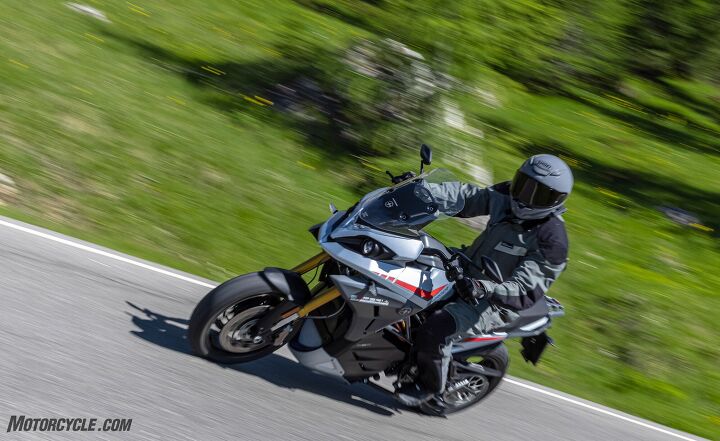
Electronics
Given that the Experia is an EV motorcycle, it should come as no surprise that the electronics package is fairly complete. Starting with the 5-in. TFT display, which Energica says puts out a bright 1,000 nits over an 848 x 480 pixel resolution. Even with my old eyes, the screen is easy to read in a variety of light conditions.
As we have now become accustomed, the TFT’s menu-driven settings are accessed via handlebar controls. Here is where you access the seven ride profiles (Eco, Urban, Rain, Sport, and three custom). These modes cover the power delivery and the Traction Control settings handled by the Cornering Bosch 9.3 MP system. Additionally, there are four regenerative modes, High, Medium, Low, and Off. Cruise control is also included.
Rubber Meet Road
Looking at the Experia and its aerodynamic bodywork, my initial impression was that of the Ducati Multistrada V4. While the Experia has more plastic down at the bottom of the fairing, the profiles are certainly similar. Perhaps this is the effect of both of them having Italian designers. However, the moment the Experia is powered up through its multi-step process, all similarities disappear.
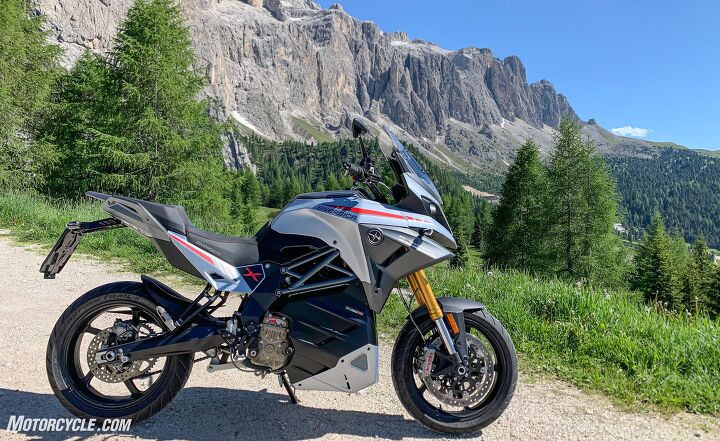
Energica chose an idyllic location to demonstrate the touring chops of the Experia.
Since there were twice the media as there were Experias at the introduction, I had the chance to ride the current iteration of Energica’s previous models prior to throwing a leg over the Experia. Although this drastically minimized my time on the Experia, I was immediately able to compare the way the bikes carry their weight. The simple act of riding out of the gravel parking lot and turning onto the pavement told me I was in for a completely different ride.
I’ll start with the power delivery, though. Knowing that the Experia’s new motor was tuned more for efficiency than outright power (peak 102 hp. VS the 126 hp peak of the Energica Ego), I wondered how much of an effect that would have on the alpine ride. In the end, I shouldn’t have wondered. Energica claims the torque ranges from 85 lb-ft to 664 lb-ft at the rear wheel due to the range-increasing ride modes and gear reduction. Cracking the throttle delivers immediate acceleration, and twisting it to the stop engages warp speed. A side-by-side comparison with an extended straight would be required to truly exploit the difference in power. In the real world of winding switchbacks and slow-moving traffic, the Experia sliced its way through the slower vehicles.
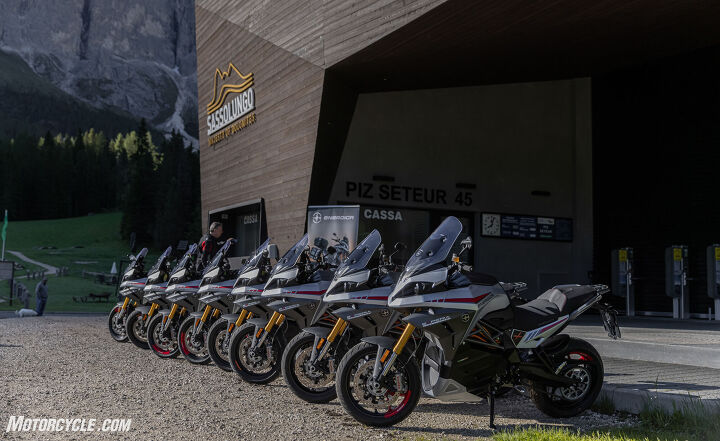
One thing I love about the power delivery of electric motorcycles is the way the battery regeneration can be tuned to give the rider the preferred level of “engine braking” or, even better, a reverse throttle to dial in the amount of braking required for a particular situation. Let me explain. With ICE motorcycles, you have an infinitely-adjustable range of on-throttle, a narrow range of neutral-throttle, and off throttle. With the current state of EV power control technology, on- and neutral-throttle are the same, but off-throttle can be dialed in over a certain range of rotation on the grip, a reverse throttle. For the bulk of my ride, I kept the regen set in the medium range, and found that as we rode with and around traffic, I rarely had to touch the brakes – unless I was charging hard into a corner. If I owned this bike, I could see my riding style adapting to the high regeneration setting fairly quickly. It really is a pleasure to use as a means of trailing the “brakes” (deceleration, actually) into the corner with the grip instead of the brake lever.
When the brakes are required, the Brembo calipers made great use of the 330mm discs to haul the bike down from speed. I didn’t get a chance to ride them at the limit since this wasn’t that type of ride, but the brakes were great for spirited sport-touring duty. The same can be said of the Sachs suspension. It provided the bump absorption necessary for making time on relatively smooth mountain roads, though I did notice some forward chassis pitch as is fairly typical of tall, long-travel suspension. Since we were riding without luggage or cargo, I can’t say how they would work over a wider variety of conditions. Fortunately, Energica has said they will be maintaining a test fleet on the West Coast later in the year.
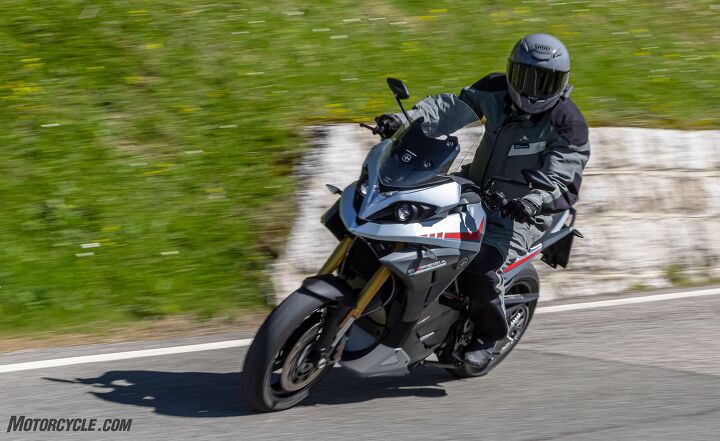
But the Handling
As I said, I knew the Experia was going to be different from all the other Energicas I’d ridden previously in the first 100 feet. Whereas with the previous models, I could never escape the feeling that I was piloting a big, heavy motorcycle, the Experia felt deceptively light. Side-to-side transitions were almost effortless and perfectly suited for the snaking alpine roads selected for the introduction. Changing lines mid-corner was a non-issue. The Experia’s weight does become more apparent during braking, particularly downhill. Still, before people try to bag on it for being heavy, I feel I must note that at 573 lb., it only weighs about 35 lb. more than the Ducati Multistrada V4 S that I spent a week scything through Virginia and North Carolina on in April. On a touring model, that’s almost the same zip code.
So, after a short ride through the Dolomites, I’m left feeling pretty impressed with how well the Experia performs as a sport-touring motorcycle. Whether it can be effectively used in that role depends on where you live. Here in California (which just so happens to be Energica’s biggest market), I’m pretty sure that I could plan a fun weekend tour around charging stations, and I hope to be able to do so as soon as the bikes arrive Stateside. Still, it would require some planning to pull off, but since I love maps and planning road trips, I’m willing to accept the challenge.
Within days of this review being posted, Energica will begin full production of the Experia in the company’s expanded (as of July 1) production facilities. The Energica Experia RS is currently available for pre-order and will be available in Energica dealerships worldwide in the Fall. The Energica Experia starts at $25,880 and will be available in Bormio Ice.
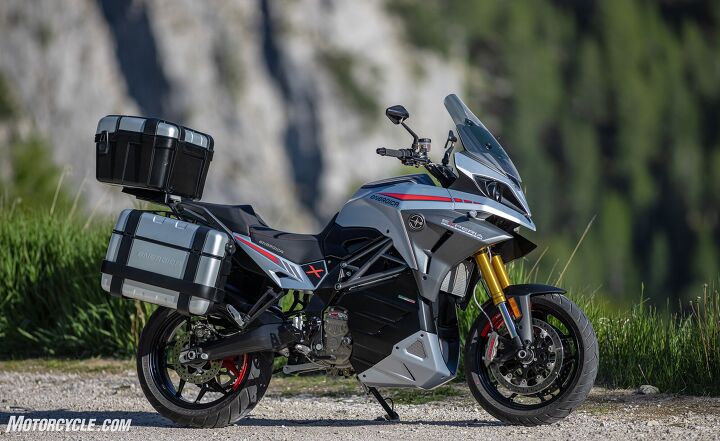
The Energia Experia ready for travel with the accessory hard luggage.
| 2023 Energica Experia RS Specifications | |
|---|---|
| MSRP | $23,750 base, $25,880 Launch Edition w/ saddlebags and top case |
| Motor Type | Permanent Magnet Assisted Synchronous Reluctance Motor (PMASynRM) |
| Rear Wheel Horsepower | Continuous: 60kW/80Hp at 7000 rpm – Peak: 75kW/102Hp at 7500 rpm |
| Torque | 115 Nm / 85 ft lb. – 900 Nm / 664 ft lb. at wheel |
| Final Drive | Chain |
| Front Suspension | ZF Sachs 43 mm inverted, 5.9-in. travel, adjustable preload, rebound, and compression |
| Rear Suspension | ZF Sachs shock, 5.9-in. wheel travel, adjustable rebound and preload |
| Front Brake | Dual 330mm discs, radial-mount, four-piston Brembo calipers, ABS |
| Rear Brake | 240mm disc, two-piston Brembo caliper, ABS |
| Front Tire | Pirelli Scorpion Trail II (120/70-17) |
| Rear Tire | Pirelli Scorpion Trail II (180/55-17) |
| Rake/Trail | 25.0 deg/4.1 in |
| Wheelbase | 59.5 in. |
| Seat Height | 33.3 in. |
| Curb Weight | 573 pounds (claimed) |
| Battery Capacity | 22.5 kWh |
| Range | City: 261 miles, Combined: 160 miles, Highway: 130 miles (claimed) |
| Colors | Bormio Ice |
| Warranty | 2 years on vehicle – 3 years / 31.000 miles on battery |
We are committed to finding, researching, and recommending the best products. We earn commissions from purchases you make using the retail links in our product reviews. Learn more about how this works.
Become a Motorcycle.com insider. Get the latest motorcycle news first by subscribing to our newsletter here.
